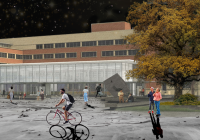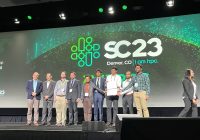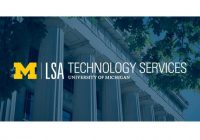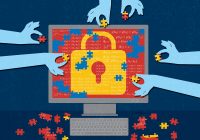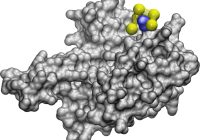Tag Archives: research
U-M unveils GenAI Mind Meld: Control your computer with just a thought!
Leadership Profile: Joe Gregoria
Tech Tip: Omnivore
Digitizing 1.7 million specimens at the U-M Herbarium with AI
The University of Michigan Herbarium is home to some of the finest botanical collections in the world. Founded in 1837 and growing ever since, their 1.7 million specimens of vascular plants, algae, bryophytes, fungi, and lichens, combined with the expertise of the faculty-curators, students, and staff, provide a world-class facility for teaching and research in systematic biology and… Read More »
Can a Student-Built Maizey Survive a Blind Test?
Unlocking Hydrogen’s Potential: Leveraging U-M Advanced Research Computing for Enhanced Vehicle Fuel Usability
RAGs to Research: Exploring Applications for Maizey in Undergraduate Research
Building Inclusive Digital Environments for Research
Research is how we learn, but our findings depend upon robust data, derived from the populations we seek to serve. As teams build digital environments for research, effort must be put into ensuring that those environments support the populations of study. When constructing digital environments for research, teams must think broadly about the full research experience to include emails or SMS sent, websites, webapps or native apps provided, and any devices included or issued. In addition, it cannot be stressed enough: the work in creating these environments is never done!
Automated Data Cleaning for Sleep Data from Wearables
Automated sleep data cleanup and processing to harmonize Fitbit data obtained via Fitabase with self-reported sleep diary entries sent via SMS-to-Email. This project uses Microsoft Power Automate for processing sleep diary entries in a shared mailbox, and Excel / Power Query for loading and cleaning sleep stages and HRV data.
Wolverine Crater opens for research
Our lunar base at Wolverine Crater was completed on April 1, 2024. This state-of-the art facility is the home of the Michigan Information Technology to Enable Networking in Space (MITTENS) team that deployed MUniverse, the first academic WiFi network in space, for our students, faculty, and staff to take remote learning and working to a whole new level.
Using natural language processing to improve everyday life
Technology supports researchers’ quest to understand parental discipline behaviors
How do different types of parental discipline behaviors affect children’s development in low- and middle-income countries (LMICs)? A group of researchers set out to understand that question. They used a large data set from UNICEF of several hundred thousand families. The data came from the fourth (2009–2013) and fifth (2012–2017) rounds of the UNICEF Multiple Indicator Cluster Surveys. … Read More »
Gordon Bell Prize winning team also leverages ITS services
A U-M College of Engineering team led by Vikram Gavini was recently awarded the prestigious ACM Gordon Bell Prize. The honor was presented in recognition of their outstanding achievement for developing and demonstrating an approach that brought near-quantum mechanical accuracy for large systems consisting of tens of thousands of atoms into the range of today’s supercomputers. The ACM… Read More »
U-M developers attend first-ever US-RSE conference
A contingent from U-M took part in the first-ever US-RSE (United States Research Software Engineer Association) annual conference. It was held at the University of Illinois Chicago, October 16–18, 2023. Abbey Roelofs and Michael Egan (College of Literature, Science, and the Arts), Srikanth Lavu (Marsal Family School of Education), and Andy Boughton (School of Public Health) attended the… Read More »
LSA Technology Services partners with faculty to develop MacromoleculAR research application
In May 2023, LSA Technology Services launched a new application, MacromoleculAR, that provides an interactive augmented reality (AR) experience for users to view various molecular models. The app was developed for Randy Stockbridge, an associate professor in the Department of Molecular, Cellular, and Developmental Biology (MCDB). And it’s not only great for the students in her course, but… Read More »
Secure Enclave Service rate approved, shortcode needed by July 25
The Secure Enclave Services (SES) provides improved performance for researcher workloads. ARC began billing researchers who consume more than 16 gigabytes (GB) of RAM (memory) per month on July 1, 2023. The first 16 GB of RAM (memory) is covered by the U-M Research Computing Package (UMRCP). If you have not already requested or been granted the UMRCP,… Read More »
Profiles in IT: Abbey Roelofs—Remarkable research support
Abbey Roelofs is a research software programming lead for LSA Technology Services. In her role, leads a team that does custom software and hardware development for researchers within LSA. She enjoys reading, making stuff, and being outdoors (which usually involves walking, biking, gardening or kayaking).
U-M launches Quantum Research Institute, a $55-million project
The University of Michigan recently launched the Quantum Research Institute, a $55-million project to further the development of quantum research and its applications in education. The project will recruit a potential eight new faculty members to U-M’s existing expertise, combining physicists, electrical engineers, computer and materials scientists and more. Funding for the QRI also brings lab space in… Read More »
U-M’s AI for Nanobiotics: Stopping antibiotic-resistant infections
In 2019, 4.95 million people died from antimicrobial resistance. “Even before COVID, which worsened the problem, studies showed that by 2050, the number of deaths by antibiotic resistance will be 10 million,” said Angela Violi, a professor of six studies and U-M Arthur F. Thurnau Professor of mechanical engineering. A new computer model has been developed at the… Read More »











